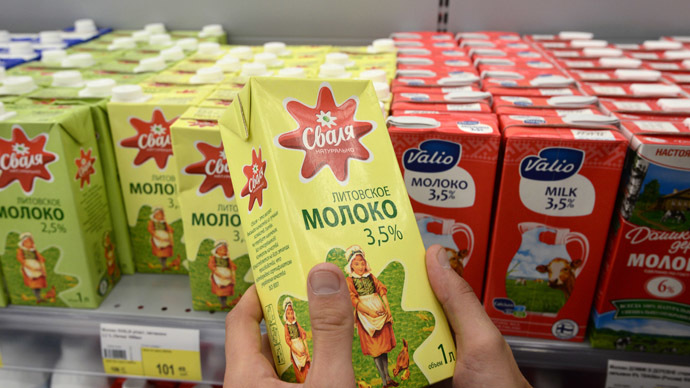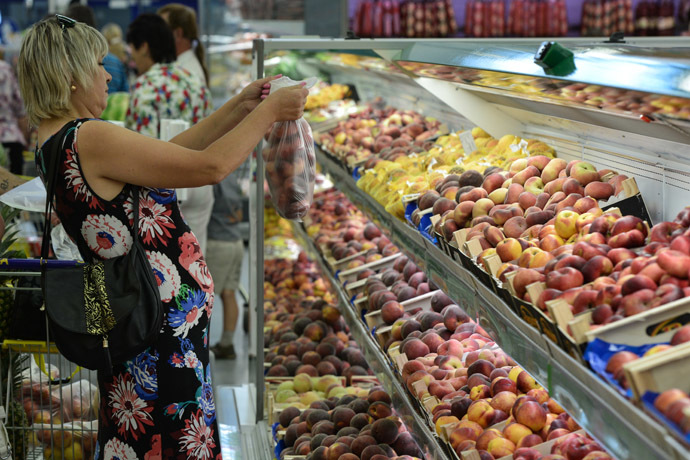Sanctioning food: Fueling opportunity

Here’s the curious rub about food sanctions, it rather throws down the gauntlet for Russia to close up a legacy of Communism.
For all those who believe in big government, food provision is a good place to start disabusing the quaint (and horribly flawed) notion that the public sector can be more efficient.
Chairman Mao starving a few million to death and Stalin not doing much better ought to have been a clue, but sadly some deluded souls still think big government can best serve their needs despite the clear evidence to the contrary. Over 20 years into the transition from central planning to a free market, the legacy of Communism’s destruction is still writ large in the Russian agricultural market.
That in essence is why the latest spat in the sanctions shenanigans delivers an intriguing incentive to Russian farmers.
Of course, in the short term there may be an opportunity for another pivot substitution. In any case, simply implementing the blunt bludgeon of sanctions has become an increasingly flawed approach.
When the West was dominant in the global supply chain, a modest, unified front in sanctions could de facto shut off supply. Nowadays the increasing breadth of globalization has left multiple nations perfectly positioned to provide substitute products in a broad range of goods.
Thus Western nations probably come off worse in Russia’s retaliatory sanctions as the fragile eurozone economy will clearly suffer as food is exported from South America instead of via the EU’s bloated subsidy regime.
Moreover, European suppliers may have to accept lower prices to sell their produce elsewhere.
Will Russia pay more? This depends on how swiftly producers (at home or abroad) can fill the gap – buying precisely the same processed brands through black market channels will of course cost more, but the substitution effect in core groceries may not be so marked. Besides, older Russians used to shortages in the bad old days may find it easier to migrate back to more staple local foodstuffs as opposed to imported seasonal fruit/vegetables, and particularly processed products.

A key challenge for Russia will be galvanizing private agriculture to make the leap forward to productive standards commonplace in the West – a point already clearly made by Prime Minister Medvedev.
Food productivity in Russia still lags hugely behind the standards of Western nations. Russian crop yields are often less than a third of the levels commonplace in the EU. That makes for a huge opportunity to profitably feed more citizens from the nation’s farms.
In sanctioning Western imports, Russia has simultaneously thrown down the gauntlet to its private farming industry to fill the legacy void created from the daft destruction of Comrade Stalin onwards.
This is perhaps the oddest possible side effect of a situation where many tables seem to have turned. In the old days it was Russia which headed a subsidy-ridden stagnant economy where the power of regulatory fiat and central government power was ultimately going to destroy the multinational power bloc which was the Soviet Union. Now it is Brussels which heads a remarkably stagnant multinational entity where the central government meddles incessantly, but fails to actually deliver a better standard of living while spending breathtaking sums on agitprop to convince the population of the benefits of European Union.
This isn’t a precise metaphor, but it is a very ugly one for those who are fans of economic growth and greater prosperity.
The EU has just lost about 10 percent of its total food exports at a stroke. Another $16 billion or so of trade going up in smoke is hardly something the becalmed (to put it kindly) eurozone economy can afford. At the same time, this entire tit-for-tat of sanctions is ultimately a fools’ errand when it comes to growth, as the more each nation tries to intentionally harm its neighbors, the more third party countries are actually gifted an advantage.
Imposing a one-year ban on agricultural imports suggests Russia wants to see more dialogue, and certainly it might be better to discuss and investigate tragic recent events rather than shooting from the hip to attribute blame.
All actors who indulge in sanctions are playing a very dangerous game. The world economy remains precarious: neither Europe nor Russia can truly afford to indulge in economic brinksmanship that endangers their citizens’ welfare. Russia has gambled that it can close the productivity gap. The EU has merely gambled. It is difficult to see just where it can sell its surplus foodstuffs.
Brinksmanship risks delivering a lose-lose scenario for the entire world.
The statements, views and opinions expressed in this column are solely those of the author and do not necessarily represent those of RT.
The statements, views and opinions expressed in this column are solely those of the author and do not necessarily represent those of RT.













